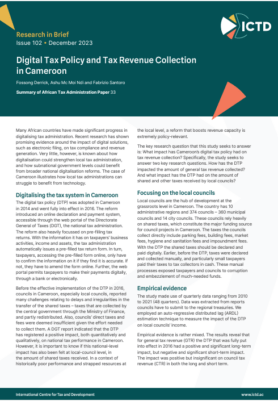Research in Brief 102
Many African countries have made significant progress in digitalising tax administration. Recent research has shown promising evidence around the impact of digital solutions, such as electronic filing, on tax compliance and revenue generation. Very little, however, is known about how digitalisation could strengthen local tax administration, and how subnational government levels could benefit from broader national digitalisation reforms. The case of Cameroon illustrates how local tax administrations can struggle to benefit from technology. The digital tax policy (DTP) was adopted in Cameroon in 2014 and went fully into effect in 2016. The reform introduced an online declaration and payment system, accessible through the web portal of the Directorate General of Taxes (DGT), the national tax administration. The reform also heavily focussed on pre-filling tax returns. With the information it has on taxpayers’ business activities, income and assets, the tax administration automatically issues a pre-filled tax return form. In turn, taxpayers, accessing the pre-filled form online, only have to confirm the information on it if they find it is accurate. If not, they have to amend the form online. Further, the web portal permits taxpayers to make their payments digitally, through a bank or electronically. Summary of African Tax Administration Paper 33.
